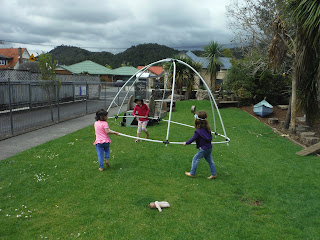Setting up
our early childhood spaces should be a thoughtful and considered notion. Every
child deserves the respect of teachers who work hard to create environments that
allow for many different types of play to take place. I am very honoured to work
amongst a team of focused, thoughtful and dedicated professionals who are
always striving to provide spaces that are inviting and safe for the children
that attend Mairtown.
Late last
year we were lucky enough to attend a workshop run by Robin Christie from
Childspace (thanks to the NKA) which focused on designing environments. One
aspect of this that stood out to us as a team was the importance of creating
protected and enclosed spaces for children, sanctuaries where children could
get away from the hustle and bustle of the rest of the kindergarten.
“Protected retreat spaces need not be huge, in fact smaller
spaces are a vital part of the recipe. Soft, inviting areas like this also act
as 'sanctuary' spaces for children to be able to have somewhere to withdraw to
when they feel overwhelmed, aiding in developing self-regulation.” (Childspace)
On
reflection we realised that this was something that we were already
successfully doing within our kindergarten environment in some respects but
enjoyed the inspiring ideas that we could add to our bag of tricks. With that in mind we returned to work and began planning how we could enhance the learning
environment for our children.
Children
love to be in spaces where they can ‘shut’ others out. This may sound harsh but
it is valid and empowering for them. Being able to take control of a space and
make it their own through their imagination and play is a very important.
Children are often more open and free in the way that they verbally express
themselves through imaginary play when they feel that there is no adult
‘watching’ or ‘listening in’. So as teachers we like to create spaces where
adults can still safely keep an eye children, but in an unobtrusive way.
Here are a
few examples of ways that we took information and ideas from Robin Christie's
workshop and how we implemented them into our practice. We started with the whare
tākaro (play house) upgrade.
This was always a nice space for children’s play however
as a team we felt that it could be enhanced by adding a new beautiful fence
and gate around the outside of the deck to give it more of an enclosed feeling.
This has been done and the way that the children are interacting with the space
is just lovely to observe; they seem to really enjoy the act of closing the gate behind
them. There is a lot of in-depth imaginary play that has been taking place as
well as some solitary and small quiet play. All in all it has added a wonderful
new space for our children to explore.
"Being able to relax and feel protected from intrusion
or competition, as children play alone or with a friend, helps them regain
their inner peacefulness."
(Cryer, Harms, & Riley, 2003)
Another idea which we took from our workshop was using electrical
conduit and electrical tape to make light weight, easily moveable huts. Thanks
to Scott Electrical Whangarei who donated the conduit we have been able to make two huts.
These have proven to be popular with the children. One is smaller and is in our
sandpit at the moment. We find children playing within the hut and although it
doesn’t have any ‘walls’ it seems to outline a special place for children to
take ownership of.
Our other conduit hut is bigger and has been used in a
number of ways, often having a cover over it which makes it a space were
children meet and play. The huts can easily be moved by the children, making their play with it more interesting and fun. Both constructions have added lots of value to the
environment that we provide for our children.
Kable (2010)
beautifully reflects on creating special spaces for children by saying “Spaces
to pause, spaces to hide, spaces to meet, small spaces; secret places:
children love to have nooks, crannies, cubbies and places to kick
back and relax in their play spaces.”
Here are a
few of the other small, protected and enclosed spaces that we have at Mairtown Kindergarten.
Tee Pee
Bed Swing
Hammock
Mosquito Net
Family
corner
We look
forward to watching the children from Mairtown Kindergarten interact with all
the small enclosed and protected spaces. As a team we are committed to providing our Mairtown Kindergarten community with a learning environment that fosters children's development in a holistic and meaningful way. This is just one small snippet of the thoughtfulness that goes into our work.
Kindest Regards,
Zair
"Children’s well-being,
safety, learning and social development, as well as their essential enjoyment
of childhood, are affected by the extent and the quality of their opportunities
to play. By the same token, the cooperation of many different professionals and
roles is needed to ensure a cohesive and effective approach."
(Shackell,
Butler, Doyle and Ball)






















No comments:
Post a Comment